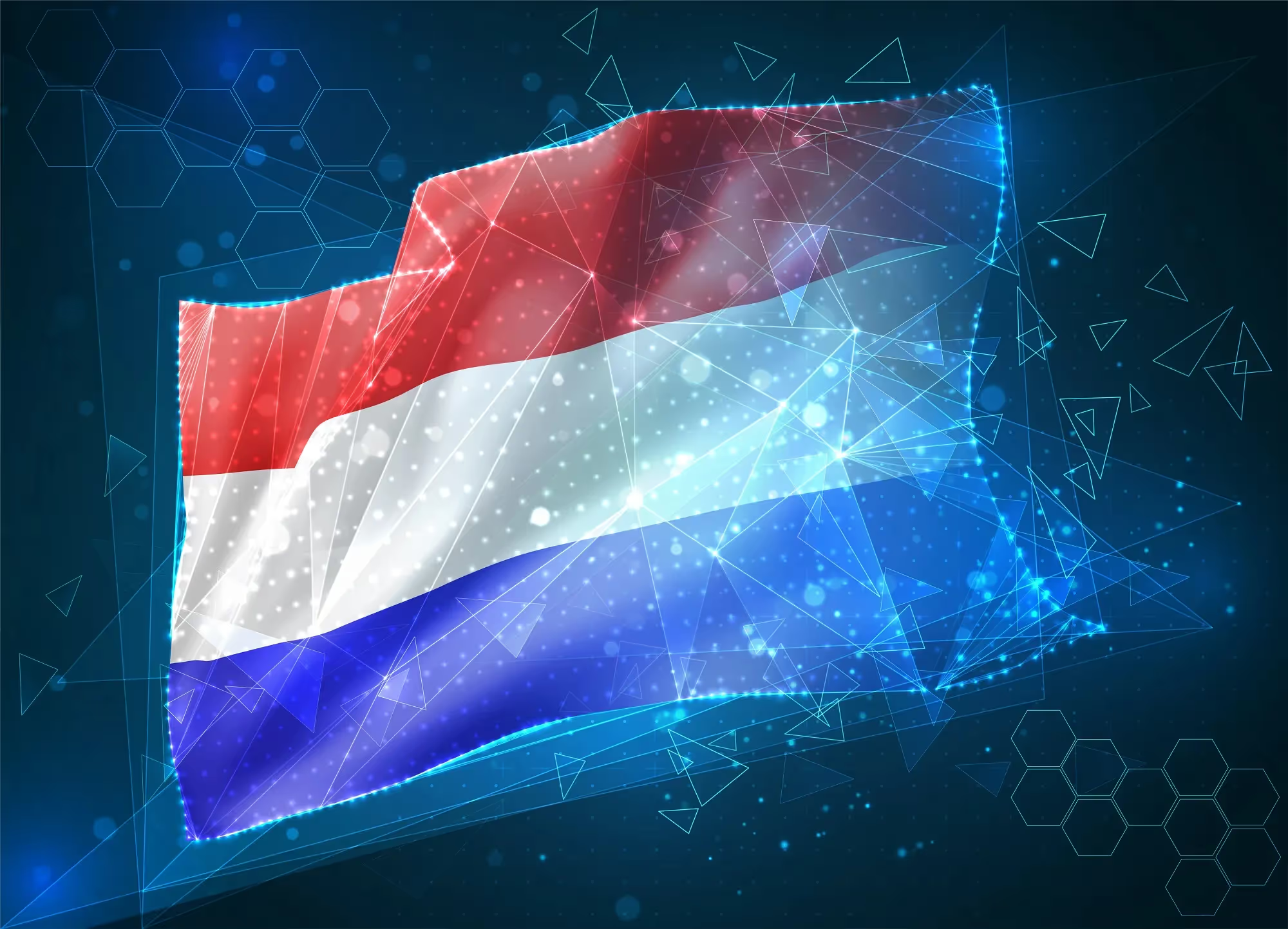The shape of the IT market in the Netherlands in 2023

The Netherlands is a country located in Northwestern Europe and the largest of four constituents of the Kingdom of the Netherlands. It is also a member of the European Union, Eurozone, G10, NATO, OECD, WTO, Schengen Area, and Benelux Union. The total area of 41,850 km2 (16,160 sq mi) is home to an estimated 17,337,403 people, which makes the Netherlands 16th most densely populated country in the world (and 2nd in Europe). Amsterdam, Rotterdam, The Hague, Utrecht, and Eindhoven are the country’s 5 largest cities and top IT hubs.
Historically, the Netherlands was home to many world-renowned scientists and innovators, including one of the greatest Renaissance scholars Erasmus of Rotterdam, an engineer, astronomer, and inventor, Christiaan Huygens, an early Enlightenment philosopher Baruch Spinoza, a physicist and inventor Daniel Gabriel Fahrenheit, a chemist Petrus Jacobus Kipp, and a computer scientist and programmer Edsger W. Dijkstra. When it comes to current times, it’s worth mentioning that Guido van Rossum, the creator of the world-renowned Python programming language, is Dutch.
A parliamentary constitutional monarchy since 1848, the country ranks high in the press and economic freedom, quality of life, and happiness rankings. Highly skilled, tech-savvy, multilingual, and international employees make the Netherlands one of the best European countries to conduct business. According to OECD Data, the Netherlands enjoyed a GDP of $63,419 USD per capita in 2021. Their continually rising education spending was 5.2% of GDP in 2017 and reached $20,889 USD per student in 2019.
The research conducted by Statistics Netherlands (CBS) shows that as much as 50% of persons aged 17-74 in the Netherlands (and 78% of Dutch people aged 17-24) have above-basic overall digital skills. More than 50,000 students in the academic year 2021/2022 enrolled in computer science programmes at universities and other higher/secondary education institutions. In the 2020 Q4, the ICT sector in the Netherlands comprised 82,000+ companies. In 2021, 1 in 20 persons within the Dutch workforce was employed as an ICT specialist. The US International Trade Administration calls Information and Communication Technology the best prospect industry sector in the Netherlands.
Read further to familiarize yourself with the Netherlands 2023 IT landscape in the context of business development and talent acquisition strategy in the country.
The top 5 reasons to invest in the Dutch IT market today
- The Netherlands has 4th best education system in the world, with 14 universities, 34 professional education universities, and a number of other educational institutions. The SCImago Institutions Rankings (SIR) ranked the Delft University of Technology in the Top 20 overall academic and research-related institutions in European Union.
- Around 90% of the Netherlands population speak English. Moreover, they’re so fluent in English that linguistics expert Alison Edwards claims it’s no longer a foreign language in the country.
- The Dutch Business confidence index (BCI) bounced back to pre-pandemic levels in 2022 and currently is the 5th highest in European Union. In 2020, the gross domestic spending on R&D was 2.3% of GDP.
- The Netherlands incentivizes entrepreneurship with business-friendly regulations, government funding, investment loans, and proof-of-concept funding. The country also works with private investors and investment banks to facilitate more financing opportunities.
- The world-class infrastructure in the Netherlands empowers business growth. The Port of Rotterdam is the largest port in Europe. Amsterdam Schiphol Airport was ranked 7th best in Europe. 3,500+ kilometers of motorways and 7,000+ kilometers of rails cut across the country. 98% of the nation has access to fast broadband Internet and 99% to 4G network.
The Netherlands in rankings
The country consistently ranks high in various relevant international rankings. Below, you’ll find some of the most important ones.
Global Services Location Index (GSLI)
In the latest Kearney Global Services Location Index (GSLI 2021), the Netherlands was placed 9th in the digital resonance ranking, which scores countries on digital skills of the workforce, digital outputs, corporate activity, intellectual property rights, and other business activity aspects. Kearney has praised the impressive levels of investment and startup activity in the Netherlands, which debuted in the ranking that year.
Overall, the Netherlands was placed at 47th, but in the scenario where the digital resonance score was adjusted as a deciding factor for location strategies, the Netherlands landed in 7th place. Additionally, according to the report, the country’s digital investment in media tech has grown the fastest in the years 2017-2020. The Netherlands ended up in 5th place globally in this category.
Global Innovation Index
The World Intellectual Property Organization’s Global Innovation Index (GII) measures the innovation ecosystem performance since 2007. In 2022, the report focused on the future of innovation-driven growth in the face of an ongoing COVID-19 pandemic and slow productivity growth. The Netherlands, with a score of 58.0, was ranked as the 5th innovation economy in the world (and 4th in Europe).
Ease of Doing Business Ranking
Launched in 2002, the World Bank Group’s Doing Business ranking measured how local business regulations impacted the companies operating in 190 economies. Although the project was discontinued in 2021, its website is still available and continues to inform organizations about the ease of doing business around the world. In DB 2020, the Netherlands was ranked at 42nd place overall, 24th place in the Starting a Business category, and 1st in the Trading across Borders category.
EF English Proficiency Index
According to the world’s largest English skills ranking, the EF English Proficiency Index (EF EPI), the Netherlands is the #1 top country in the world with an EF EPI score of 661. Based on test results of 2.1m adults in 111 countries & regions, the global average score is 502. Moreover, The Hague, Utrecht, Breda, Amsterdam, and Rotterdam scored even higher, and the scores were consistently very high in all age groups.
World Digital Competitiveness Ranking
In the World Digital Competitiveness Ranking 2022, the Netherlands was 6th, ranking one place higher than the previous year. Published by the IMD World Competitiveness Center, the ranking compares 63 economies’ capacity and readiness to adopt digital technologies and use them as key drivers for further economic transformation. The WDCR 2022 report named highly-skilled personnel, IT & media stock market capitalization, country credit rating, communications technology, and knowledge transfer as the overall top strengths of the country.
Other rankings
- 9th place in the Bloomberg Innovation Index 2021,
- 9th place in the United Nations’ E-Government Development Index 2022 (EGDI),
- 11th place in the Renewable Energy Country Attractiveness Index 2021 (RECAI) by EY,
- 18th top country in the Hurun Research Institute’s Global Unicorn Index 2021.
The challenges you can encounter in the Netherlands
- According to Statistics Netherlands (CBS), the economic outlook as of January 2023 is negative. Although consumers in the Netherlands are less pessimistic and producer confidence is improving, there is also bad news. Dutch manufacturing industry output went down, the number of companies that declared bankruptcies went up, and the GDP in Q3 2022 decreased by 0.2 percent relative to the previous quarter.
- According to data published by Statista, people in the Netherlands considered the rising cost of living, inflation, and climate change as top issues the country faces (as of summer 2022). It’s worth considering these issues as they certainly influence the IT sector indirectly.
- Dutch IT specialists are not cheap. For example, according to Payscale, an average software engineer in the Netherlands earns €49,360 a year. It’s less than €55,907 a year in Germany or €66,943 in Denmark, but also considerably higher than €42,833 in France, €24,252 in Poland, or €7,105 in India.
Top IT hubs in the Netherlands
Amsterdam, Rotterdam, The Hague, Utrecht, and Eindhoven are the 5 biggest cities in the Netherlands and also the most important IT hubs there.

Amsterdam

Municipality Area: 219.32 km2 (84.68 sq mi)
Urban Population: 1,459,402
Metropolitan Population: 2,480,394
Time zone: UTC+1 (CET) in winter, UTC+2 (CEST) in summer
Climate: oceanic
Education: At the University of Amsterdam, which teaches 40,000+ students, the Faculty of Science covers a wide area of education, including information sciences. According to the Center for World University Rankings, it is the #2 top university in the country and #84 in the world. The Vrije Universiteit Amsterdam (#6 in the country and #142 in the world), with about 30,000 students, teaches the Computer Science programme at the Faculty of Science. The Amsterdam University of Applied Sciences, with about 43,000 students, holds courses in Business Informatics, Computer Science, and Information Engineering, as well as multiple Technology programmes.
Economy: Amsterdam was named the 3rd-best startup city and 5th-best scale-up city by the European Digital City Index 2016, a ranking financed by the European Commission and authored by the European Digital Forum and Nesta. The report measured the support startups and scale-ups in digital industries get in different European cities. The ranking’s purpose was to provide a holistic overview of Europe’s best digital ecosystems by accounting for various policy, economic, social, cultural, and technological factors.
The Digital Cities Index (DCI) 2022 was developed by Economist Impact in collaboration with NEC to rank 30 global digital hubs worldwide according to their digital connectivity, services, culture, and sustainability. In this first iteration of the DCI, the research team behind the project ranked Amsterdam in 2nd place when scores and ranks were based on the Economist Impact weights and in 4th when scores and ranks were based on equal weights.
Notable companies: ABN AMRO (banking), Booking.com (tourism), Exor (investment services), General Logistics Systems (delivery services), ING Group (banking), Just Eat Takeaway (food delivery), SPAR (retail), TomTom (software).
Notable startups: Mambu (banking software), MessageBird (cloud communications platform), Mollie (payments platform).
IT market facts: Amsterdam is the European headquarters for several global tech leaders and cloud infrastructure providers, including Cisco, IBM, Microsoft, and Oracle, as well as 2.744 startups, scale-ups, and grownups. Initiatives like Amsterdam Science Park and Startup Village support new tech companies and innovation in the city.
Eindhoven

Municipality Area: 88.92 km2 (34.33 sq mi)
Urban Population: 337,487
Metropolitan Population: 780,611
Time zone: UTC+1 (CET) in winter, UTC+2 (CEST) in summer
Climate: oceanic
Education: Eindhoven is home to public and private higher education institutions, including the Eindhoven University of Technology (#11 university in the country), which comprises departments of Applied Physics and Science Education, Mathematics and Computer Science, Mechanical Engineering, Biomedical Engineering, Industrial Engineering, and more. Fontys University of Applied Sciences offers many ICT and Engineering programmes. SintLucas is a school for creatives that teaches software development courses.
Economy: Eindhoven was named one of the two most science- & technology-intensive clusters in the Global Innovation Index 2022, along with Cambridge in the United Kingdom. Professional, Scientific, and Technical Services comprised around 16.9% of the city’s economic composition. Computer and Electronic Product Manufacturing is another 2.22%, according to Metroverse.
Notable companies: DAF Trucks (automobile), NXP Semiconductors (technology), Philips (consumer electronics).
Notable startups: Axelera AI (artificial intelligence), Microsure (MedTech), Withlocals (tourism), Sketch (digital design).
IT market facts: Eindhoven’s strong focus on innovation has been around for a while, as the city is the birthplace of world-renown Philips electronics. Two tech hubs in the city - Brainport Industries Campus and High Tech Campus Eindhoven - are home to around 380 companies. International tech enterprises like ASML and NXP Semiconductors also chose Eindhoven as their home base. Altogether, the Brainport region is home to over 5,000 tech companies.
Rotterdam

Municipality Area: 324.14 km2 (125.15 sq mi)
Urban Population: 1,273,385
Metro Population: 2,390,101
Time zone: UTC+1 (CET) in winter, UTC+2 (CEST) in summer
Climate: temperate oceanic
Education: The city is home to the famous Erasmus University Rotterdam, which teaches faculties in health, wealth, governance, and culture. From a technology perspective, there are 39,000 students at the Rotterdam University of Applied Sciences, which offer courses in designful innovation, game design and development, and VR/AR/MR innovations. Additionally, according to the Center for World University Rankings, the Delft University of Technology, which is the #10 top university in the country and #259 in the world, is located nearby, just a couple of kilometers north.
Economy: It’s hard to compete with the economic significance of the Port of Rotterdam, but Rotterdam is also a national leader in offshore wind energy and a strong contender in the digital technologies space. According to Economic Outlook Rotterdam 2022, Rotterdam’s economy remains strong, although the labor shortage in the city is unfortunately quite large. When it comes to tech, the city suffers from an unfortunate mismatch: IT experts in the city specialize in skills that the companies do not seek.
Notable companies: Hunter Douglas (building), Royal Van Oord (marine engineering and construction), Vitol (energy).
Notable startups: HelloPrint (digital marketplace), Lendahand (crowdfunding), Shypple (freight-forwarding)
IT market facts: The municipality of Rotterdam strongly supports startups and scale-ups and invests in digital information technology. Initiatives like IT Campus Rotterdam, Erasmus Centre for Data Analytics, CIC Rotterdam, and Up!Rotterdam drive innovation further by forming a solid support network for entrepreneurs, researchers, and technology experts.
The Hague

Municipality Area: 98.13 km2 (37.89 sq mi)
Urban Population: 883,720
Metro Population: 2,390,101
Time zone: UTC+1 (CET) in winter, UTC+2 (CEST) in summer
Climate: temperate oceanic
Education: Even if the city is known as the home of international law, the education establishments in the city are very diversified. The Hague University of Applied Sciences holds a Faculty of Technology, Innovation & Society. The Open University of the Netherlands offers a Science Faculty with Environmental Sciences, Computer Science, and Information Science programmes. Additionally, Leiden University’s “Campus The Hague” includes the Wijnhaven building that hosts the Centre for Innovation’s Future Lab and Delft University of Technology’s Massive Open Online Courses (MOOCs). The city of Delft, home to the Delft University of Technology, is just south of The Hague.
Economy: The Hague is home to thriving businesses across many economic sectors, including law, banking and finance, energy, security, and digital technology. Agencies like the International Court of Justice and Europol are present in the city, supporting the influx of a genuinely global community by generating around 40,000 jobs in the area. Statistics say there are more than 70,000 companies in The Hague, which employ approximately 312,000 people.
Notable companies: Aegon NV (insurance), ASN Bank (banking), Nationale-Nederlanden (financial services), PostNL (delivery services), Shell (energy).
Notable startups: Circularise (supply chains software), Cybersprint (cybersecurity), Eye Security (insurance and cybersecurity)
IT market facts: Top IT companies with offices in The Hague include Amazon, Apple, DXC Technology, Google, and Siemens. The city is also home to over 1500 startups. The State of European Tech 2018 named the Hague one of Europe’s fastest-growing tech hubs. The Security Delta (HSD) initiative, headquartered in The Hague, facilitates cooperation on innovative security solutions between governmental organizations, knowledge institutions, and private companies.
Utrecht

Municipality Area: 99.21 km2 (38.31 sq mi)
Urban Population: 489,734
Metro Population: 656,342
Time zone: UTC+1 (CET) in winter, UTC+2 (CEST) in summer
Climate: temperate oceanic
Education: The city is a host of many important higher education institutions, including Utrecht University, which is #1 top university in the country and #71 in the world, according to the Center for World University Rankings, and the University of Applied Sciences Utrecht, with 35,000 students and programmes in big data, business innovation, data-driven design, and engineering.
Economy: Utrecht’s economy largely depends on large organizations headquartered in the city. It is home to the head office of Dutch railway operator Nederlandse Spoorwegen, governmental railway network institution ProRail, and multinational banking and financial services company Rabobank. But the city’s localization, entrepreneur-friendly atmosphere, and well-educated workforce are increasingly attractive to companies in many sectors, including banking, ICT, healthcare, logistics, and the creative industry.
Economic Board Utrecht is an organization that facilitates cooperation between the regional business community, knowledge institutions, and the government. The EBU network leads the economic conversation in the area by lobbying for sustainability and rapid technological changes and working towards the ambitious goal of becoming the healthiest region in the world.
Notable companies: Blendle (online news), Douwe Egberts (coffee), Rabobank (banking).
Notable startups: Channable (eCommerce growth platform), Sensorfact (energy management system).
IT market facts: Most famous ICT businesses with a presence in Utrecht include Atos, Capgemini, Oracle, and Ordina. Various startup incubators exist in the city (e.g., Graduate Space, Jaarbeurs Innovation Mile, UtrechtInc).
The Profile of a Dutch IT Expert
According to the State of European Tech 2019, there are more than 320,900 software developers in the country. Payscale data suggests that JavaScript, Java, SQL, C#, and Python are the most popular skills for software engineers and developers in the Netherlands. Data Specialists usually use Python and SQL. When it comes to salaries, IT Shifting reports that the average salary in the IT sector is around €4,950 ($5,300 USD) per month, ranging from €2,610 to €7,900. information security analysts enjoy the highest average of €5,400 per month, and the Scrum masters average is the lowest - €3,860 per month.
In 2021, European tech-focused job platform Honeypot created the Developer Happiness Index (DHI), which aims to provide insight into how happy developers around the world are. They scored countries according to four major factors: career, quality of life, social freedom, and community. The results come from a self-evaluation of 4,000 developers worldwide performed in 2021. In this ranking, the Netherlands ties with Switzerland and Austria in third place, with Norway in second and Denmark in the first place.
According to Honeypot's findings, 40% of Dutch developers are very happy with their careers, and the outstanding work-life balance they enjoy is the factor that keeps them satisfied. Similarly to the rest of the world, women devs are statistically happier than their male colleagues. This is especially interesting since the number of women who chose a career in ICT has increased in recent years. Partially - thanks to the government support program Human Capital Agenda ICT, as reported by Computer Weekly. However, in 2021, men still accounted for more than 80% of Dutch ICT professionals.
Modern Netherlands is a firmly multicultural country with inclusive laws and a clear immigration policy. In 2018, the most common ethnic groups in the country were Dutch 76.9%, Turkish 2.4%, Moroccan 2.3%, Indonesian 2.1%, German 2.1%, Surinamese 2%, and Polish 1%. In 2022, 2.6 million people residing in the Netherlands were born abroad. The Modern Migration Policy Act makes it easier to be admitted to the Netherlands for those who can contribute to the Dutch economy, culture, or science: entrepreneurs, highly educated and highly skilled migrants, and foreign investors.
A major magnet for an expert workforce, the 30% ruling is a tax break for employees (and some entrepreneurs) who move to the Netherlands. This tax exemption means that 30% of an employee’s salary is a tax-free allowance intended to compensate for the expenses connected with working outside of their home country. The allowance can be claimed for 5 years.
How to recruit IT experts in the Netherlands?
Finding IT experts to work in the Netherlands can be challenging, especially if you’re looking for niche tech skills in industries like banking and energy solutions. Teaming up with a recruitment partner with expertise in local regulations and immigration procedures will alleviate many possible issues. Maxima Consulting Dutch office supports global companies in IT recruitment and staff augmentation across the Netherlands. Contact us today to find out more.








